Career, commerce and project / task management in questions and answers at the Toaster

Especially for the readers of “Megamind”, our editorial board decided to accumulate in one place the most interesting questions across the whole range of topics related to our resource for the last calendar month - October.
It turned out a lot of them, as well as answers on the most acute and topical issues posed and resolved by users of the community.
Want to find out what is being asked on the “Toaster” and how to answer questions in the field of business, career and project management?

Section "E-commerce"
Interest Ask:
')
- “I am going to sell pdfs from the site. Which toolkit to choose? ”
It is required to sell zip-archives, pdf-ki from the site.
What is better to take?
How to arrange payment acceptance? So that after a successful payment, the user can download the file.
sellfy.com
files.webmoney.ru
www.clickbank.com
Look in the direction of ips, though it is paid. Well, or service oplata.info
ecommtools.com veteran

Section "Finance"
Interest Ask:
- “What does a programmer get money for?”
Hello, the question may not seem quite correct, but still help to understand what the programmer gets the money for? Those. I understand that for the development of some final product.
But here's what I can not understand, if a person takes an hourly wage, but from half and even more of these hours he understands himself, how can this be done, it turns out that he is not a very good programmer? Or is it basically a normal phenomenon? And then how do you count fewer hours?
Also, I’m still wondering what it means to support the code for which developers take a good amount if the code is written well, why support it? I understand when the customer suddenly came up with: “But I also want to do this skillfully!”, Then it’s understandable, but if you don’t do anything with the code, what is it really to take money?
Or support of the site, for example, how to take money if the site works and a person does not do anything with it, but does it receive a certain amount for the fact that it works and periodically solves some problems?
For the work. If the loader is paid for loading wagons, hourly rates, then why should he pay when he carries bags and comes back for a bag on the lighter, because it does not work?
Code can not write well never. You can only tends to this. As long as he understands this product development process. Read a book on software development cycles and understand everything.
What is the support here? Here the artist has handed over the order to you. And then he uploaded himself with others. Or vice versa - faded on the beach to wallow. And then you suddenly impatient. Here are two scenarios:
your Wishlist will be pushed to the very end of the queue / vacation, if not at all kicked out of your head
everything else will be pushed back / frozen, and you will be dealt with immediately, with the highest priority
For some reason it seems to me that with the "support" of the programmer for some time after the delivery of the order, the probability of the second option will be much higher :) Although, of course, all these things need to be explicitly stated. You do not impose them?
the phenomenon of taking money and “sorting out” is normal in the case of a constant: there is a certain rate, it depends on the skills - accumulated experience and general acumen - and there are any customer aspirations that the prog performs. Usually more than a bet - performs faster - because the skills. It’s normal that he understands working hours.
In the case when the TOR is given on freelance and the prog is taken for N hours, it is impossible to agree that 0.5 N was spent on studying the task. However, for yourself, put 1.5-2 N on the timeline voiced by programmers and constantly monitor.
Support - usually a mixture of 1 and 2 points, a certain fee for the confidence that when something needs to be fixed, the progger will not disappear. It should be in the range of 0.25-0.5 cost of understanding the task of the new proger
Product support - programming related to the fact that
1) in the product in any case there will be bugs, there will be problems, they need to be repaired
2) the customer will always want version 2.0 with new features and gadgets
3) the hardware changes, the operating system changes. What worked in win95 may not work in WinXP, what works in java6 may not work in java8, and such moments are oceans.
Well, and besides, programmers can pay by the hour, and can pay for the project. Or they may not pay, he sells the product himself or is monetized through advertising.
In general, you did not even think before asking a question.

Section "Jurisprudence"
Interest Ask:
- “How does the tax check freelancers?”
Hello!
Who knows how the tests of people who earn on freelancing without registration?
So far, I do not understand:
1) Through the bank. But only the transfer of money from different people still does not mean anything, since millions of Russians in the era of online banking are transferring money to friends and acquaintances, and just a gift. Keep track of all unreal.
2) Through the bulletin board. There was such a case, in Belarus, a guy staged a test purchase. He came to negotiate about the development of the site and he was caught on it. But someone says it was a fake. On the other hand, on freelance exchanges, thousands of people under the left nicknames and avatars earn the same money without leaving their home at all - how can they arrange a test purchase? Again, keep an eye out for everyone
1. How does it work with us, theoretically at least?
2. And in other countries like, especially in highly developed, where there are no holes in the laws and ponies poop with a rainbow. The problem is essentially the same.
no way
the bank is knocking only on large turnovers or one-time large transfers, not only on physicists but also on lawyers
tax itself is not interested in shaking small defaulters
well, let's say in the city of N lives a million people and there are 100,000 defaulters and about 100 tax specialists
Well, they physically have no time to do it
theoretically it doesn’t work like practically
in other countries, too, everything is not smooth, but there people are obliged to submit a tax return and everyone is dancing from it
in Germany, every three years, the obligatory routine check of a legal entity, once every ten years, is complete.
Only through the bank can. But many now use payment systems a la PayPal, Webmoney, use online banking like Payoneer and their counterparts. And in most of our countries, the internal currency of such systems is not always considered money (candy wrappers are driven).
I do not know any real case. Tax and freelance without work enough with the real sector. It is easier to catch a defaulter in the market or car wash, but they are not caught there especially. What to speak about freelancers ...
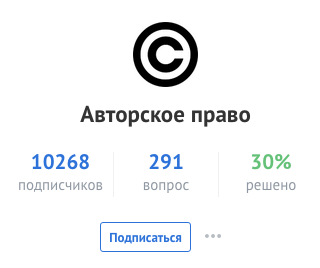
"Copyright" section
Interest Ask:
- “Do I need to ask permission of authors of foreign articles to translate?”
On Habre very often translated articles are found. Actually the question is: Do I need permission from authors of articles published in a foreign language (for example, Medium or personal blogs) to translate and post in the Russian-speaking sector?
Article 1260. Translations, other derivative works. Composite Works
[Civil Code of the Russian Federation] [Chapter 70] [Article 1260]
3. A translator, compiler or other author of a derivative or composite work shall exercise its copyright, subject to the rights of the authors of the works used to create the derivative or composite work.
1. The translator, as well as the author of another derivative work (processing, film adaptation, arrangement, dramatization, or other similar work) are copyright, respectively, on the translation and other processing of another (original) work.
As I understand it, there is no need to ask for a translation of permission, but, for example, for public publication of the translated article, yes.
IMHO, write a "Russian-language article based on", indicating a link to foreign material. Well, for appearances, you can ask, of course.

Section "Internet advertising"
Interest Ask:
- “How to develop the sectoral information b2b resource?”
Given
1. Industry Online Magazine addressed to b2b audiences
2. The industry includes several markets (video surveillance, fire protection systems, scud, voice alerts, cable products and several others)
Questions:
1. How to isolate the semantics of target audiences - after all, it will not be grocery requests?
2. How should the thematic segments in SJ be taken into account?
3. How will the site rubricator depend on SJ?
4. What format is optimal for sites of the combined subject?
5. What should be a guideline in determining goals for attendance - a) by number b) by time and depth of views
1. Search for product information markers for an example: product questions
wordstat.yandex.ru/# ! /? words =% D0% B2% D0% B8% ...
2. Create an ontology map
3. At 1000%, dictates the architecture of the site. If you need to push ontologies into a map, ontologies map = site structure.
4. Not a specific question
5. 3 metrics = 1st so that the user does not return to the search, i.e. in fact, respond to his information need (mega powerful metric), 2nd viewing depth, slip “more related” articles to the maximum relevant entry point to the site (entry point = request + page of your website in ps relevant request), 3rd the core of the audience so that a certain number of people consistently enter the site through taiping traffic.

Google Analytics section
Interest Ask:
- “The number of page views. How best to implement? "
There is a project.
25,000 hosts per day.
It is necessary to record the number of article views in the last 7 days in the database.
There is an option to enter a separate table in which each view with time will be recorded.
But as you know, the load on the database.
Perhaps there are other options?
Perhaps google analytics or Yandex. Metrics allow getting such information?
Yandex.Metrica allows .
And Google Analytics is able .
Are you looking for?
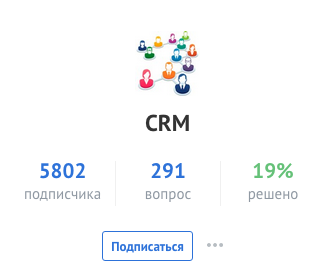
Section "CRM"
Interest Ask:
- “How to make alternate assignment of a person responsible for the new lead in bitrix24?”
Hello.
There is a website, applications (leads) are being received from it in crm bitrix24. We have three managers who process them. Is it possible to make the next manager responsible for the new lead in this crm? Ie alternate distribution.
There are no standard features, I see two solutions:
1) Organize a queue of managers through business processes.
2) Make an external application that will distribute lead managers.
By the second method I can tell in more detail.
It is done through setting up business processes for the leads. Through the action “Employee selection”, the necessary employee is selected, and then through the “Document change” is appointed responsible.
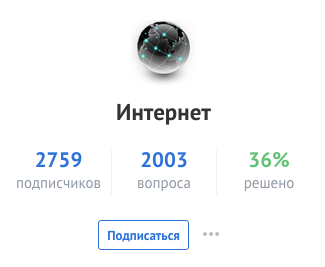
Section "Internet"
Interest Ask:
- "How to safely follow the links?"
Good day. Could someone suggest a good resource, where everything is explained in sufficient detail about how to safely follow the links from one site to another (for example, from mail). The fact is that I still have basic knowledge on this topic, I would like to know about it thoroughly.
Use only the safest browser .
+ NoScript
+ RequestPolicy
+ Https-everywhere
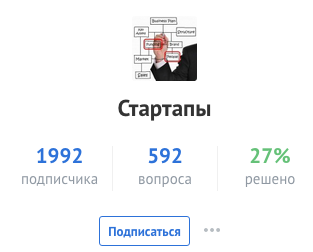
Startups section
Interest Ask:
- “What is a must have for a development studio?”
I will explain. What unobvious needs a small studio (of course in Babruisk) of 5 people may have is all coded. In addition to the documentation, the four walls, telephone and "iron" software? It is very interesting to read about personal experience, and maybe a friend of a friend once started. Please share your opinion.
customer
everything else is not important
Once I started to do saytik with a friend, only I was a “programmer”, and he was collecting orders. One of the mistakes that allowed our joint venture to be bent (we existed for almost 2 years) is:
- not an experienced programmer (this is me), plus, if they took assistants, they were even more inexperienced than me.
- a clear development plan was not drawn up, the project was not designed, which resulted in situations that could be solved at the design stage, but no, it was necessary to spend time in development time. As a consequence of this - an unexpected increase in time.
- there were no clear conditions for the customer, i.e. There was a standard contract, but, for example, the cost of the edits was stipulated on the fly, some customers had their eyes rounded and had to be done. As a result, the customer was a king and a god, and some of their payment debts have not been paid until now.
- the desire to save, no, I understand that you need to save, but not on what brings you income, that's why the designers were bad, shitty helpers, etc. Because of what the customer was not satisfied, and the period of project development is greatly increased.
- orders on complexity and requirements are incompatible with the cost, i.e. the partner took complex orders for ridiculous money, complaining that the city was small (300,000 inhabitants) and nobody wanted to pay, as a result, payments were delayed with the creation and modifications, the following orders were taken until the previous ones were left unfinished and there was a com promised.
- Well, the result of all this was a huge amount of debt and bad reviews.
Well, there were such problems at the studio “Horns and hoofs” of two people, which I remembered))
* py.sy. I do not know why I wrote it, I just remembered something.
To work as a small team is happiness. When everyone works :) and there is a result.
In order to earn, we need orders, in order to have orders, we need reputation, in order to have reputation, we need knowledge and experience, and in order to appear, we need ... orders. Vicious circle.
Before listing, I will write the most important thing - a team of like-minded people, should want to develop and achieve results and create a reputation for themselves.
Next tezisno, not in order of priority, but as recalled:
0) Need specialization for each and the team (I write as it seems, taking into account the size of your team).
* Team Leader or Senior Developer. He will set quality standards and control work. Will be responsible for the architecture.
* developer coder
* developer admin
* developer base
* A manager and if there are not enough people, he is also a salesman. Must know all the CMS that you will apply. So that he could smoothly show the client how to create a publication, edit, and so on.
1) 80% of the time to work on commercial projects and 20% of the time to work on your project. For advanced training at least. And if he shoots, then soon there will be no need to work with clients at all :) When there are no orders, everyone is working on “their” project, raising their skills, applying and testing new technologies or new workloads. If you competently come up with a task for yourself, then the process of working on it and the results can be used to promote your team. Suppose you took up the development of the module of the exchange of data of the accounting store. See what solutions are already on the market for your CMS. Make it more convenient and better or faster or stupidly better documented solution. This will allow you to get into the "store" modules for CMS and will give you new customers. When you have a narrow and high-quality solution, it will be easier for your sales person to talk to the client and get into already existing IT infrastructures. To alter the online store, no one will give you one, but they can replace the module with yours.
2) Production technology. Especially if several people work. You should have common standards and technologies for writing, documenting, working with code changes, your own “library” of solutions that you could use as often as possible. Create your checklists for the production stages and, if possible, automate routine operations.
3) If we are talking about web development, then most likely you will need to know perfectly up to three of the most popular CMS. It is advisable to get a certificate / status.
4) Standards for working with client projects are needed. TZ, documentation, customer training, and so on. To minimize labor costs or at least to minimize unpaid labor costs.
5) To know English at the level of reading documentation at least.
6) and ... slowly add new directions. To move away from a pure web to a web + mob, or from “sites” to a complex e-commerce. Ideally, when the client is less and the income is greater. This requires deep knowledge in a relatively narrow direction and two or three serious clients. Do not try to sculpt a lot of cheap sites.
In short. The peculiarity and advantage of small teams is that on the one hand they are forced to concentrate several roles or areas of knowledge in one person, but on the other hand, this will ensure faster work on the project. True, it is good when you are not just a team, but a TEAM.
This is so tezisno.

Section "Project Management"
Interest Ask:
- “What is agile development?”
As far as I understand, this is an approach to creating a product, when tasks and TK can change in real time?
Is it so?
Thanks in advance for the detailed answer!
Development methodology.
Waterfall: we carefully plan everything, set deadlines, develop, rent out.
Agile: Approximately we plan, analyze, set a deadline, plan for the current iteration, develop, plan for the current iteration, develop ..., hand over
Waterfall issues:
If someone has debated, everyone is waiting. If you need to add something, it is very difficult, because the planning phase was very long and thorough, and something to change means you have to change everything.
If the plan states that we do it first, and then something, it may happen that some people who will do “something” will be kicked for a while by “cucumbers” while waiting for the first people to do “this”.
Pros Waterfall:
Everything is planned, everyone knows exactly when they will do it.
Agile problems:
People must be mature enough to properly load themselves with work — Agile in a bureaucratic environment will simply fail.
Pros Agile:
There is practically no downtime for anyone - everyone can always get busy with tasks.
In the case of new requirements, they can without any harm to enter into the project at almost any stage. The main thing is to be technically possible (in the case of waterfall, the problem is precisely at the level of statements and plan, that is, bureaucracy)
Adequate use of labor - if someone does not have current tasks, it can officially be taken for other projects.
Agile is not a superface, it is a tool, or rather an approach to planning work, but they need to know how to use it.
Agile is an approach for developing startups. Initially released from XP and Lean Startup. His main goal - to settle somewhere in the direction of the world when everything around is incomprehensible. Waterfall is a methodology in which you see the path entirely to the desired goal.
It is a mistake to assume that waterfall is too cumbersome and it doesn’t allow doing there as Agile-type sprints or the like, which was actually invented in waterfall and was called iteration and generally came from another method - Iterative development.
Agile is more a business method than a methodology. Well suited where the client does not know how to achieve the goal and the team also does not really understand this, but he knows where to start and knows how to do some work.
From the point of view of the PM, your choice is always Waterfall, otherwise you do not control the resources, terms, quality that cannot be achieved with Agile. There you have either a fixed budget, or a time frame, and one thing drives you to another.
I use a cheat sheet for myself:
1. We and the client understand how to make the product and you can make a plan and TK - Waterfall
2. It is not clear to us or the client how to make a product and make a plan and TK - Agile
There are first and second projects, that's all.
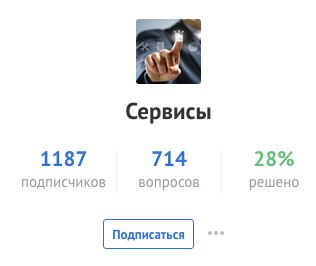
Services Section
Interest Ask:
- “What services allow you to receive a one-time SMS for registration?”
Greetings friends! There was a question about registration in the social. networks, you need to register a lot of accounts. What service can I use to receive disposable SMS? Preferably a service that can be replenished with kiwi. I used to use sms-reg, but lately it does not suit me.
Thanks in advance for your reply.
I do not know about qiwi, but in all projects I use www.twilio.com
You can also look at this: sms-area.org
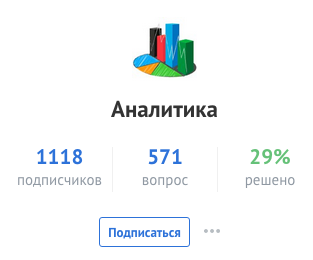
Section "Analytics"
Interest Ask:
- “Free consulting for projects. Do I need him?
It is not a secret for anyone that at the early stage of development of any project, there appear a lot of various obstacles. Whether it is poorly defined CA or not an effective model of promotion, and maybe the whole project. Such closures are the norm for "beginner start-ups".
And here we are with colleagues, we decided to take up a small altruistic matter - to conduct an express analysis of projects on a grant basis.
All this as an elective.
The team got a good one, all experts in their fields. Everyone has clear boundaries for which we try not to overstep.
So the question.
In your opinion, is it worth developing this direction? Is it worth sharing your knowledge and experience for free?
Many thanks to all who speak out. Thank!
At a certain stage of development, it is important for a startup to hear from outside. And preferably supported by something, and not just "it seems to me." Therefore, from the point of view of utility for startups, you chose the right direction. And how such altruism is useful to you is better for you. Most likely, are you planning to attract clients to paid consultations in this way? I think it is unlikely to go with startups. Few of them will become your paid client - simply because they usually spend money on development, promotion, etc., and they need to grow to realize the need for paid consultations.
Determine the border to which you give advice for free. Free consultation show your expertise, i.e. sell your services. After a certain border, you work for a currency. Such a boundary may be the number of consultations, their topics, etc.
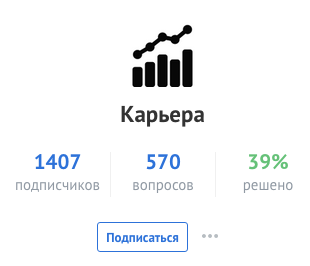
Career section
Interest Ask:
- “Did you have doubts about your profession?”
If so, how often, and in general - doubts are normal, or is it a sign that it's time to do something ???
Like most, I am a programmer.
Just by looking at people who really like programming, who can sit for hours at the monitor, who spend a lot of time on code, who quickly delve into ...
In short))) Doubts this is normal or is it a disaster?
, 3.5 SrDBA. , , . , « ». , , , , , .
. , .. .
, : « ?».
, .
, , , .
, , «». vim , « , , ».
Sr Engineer Ansible.
, , « , , ».
: « , , , .»
, , , , . , , .
, .
, -.
- — .
— , , . , , .
, . « , » - .
. .
. - , .
, , - , — , .
— .
()
, , . , . : « ! 5 ». , . ( ), . , , , .
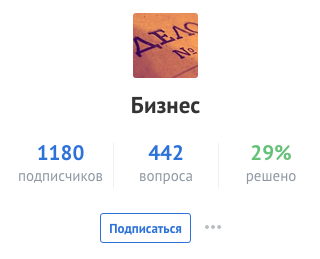
«»
Interest Ask:
- “What are the disadvantages of the idea for a startup?”
The essence of the project:
I am going to open an online store of innovative gadgets from crowdfunding sites (such as KickStarter, BoomStarter, IndieGoGo). You can buy it all the most interesting news, which previously could only read in the tape or the news.
The main difference from the analogues at the moment - delivery throughout Russia + packing gadgets in gift paper for FREE.
What do you think about the idea?
PS
: , ?
: ? , , , .., . , 2 .
Disadvantages:
1. ?
2. ?
3. ?
4. madrobots.ru, medgadgets.ru homegadgets.ru?

« »
Interest Ask:
- “What are the management systems of the team?” Comrades, tell me
if there are currently adequate “management systems for the team” (maybe this is something differently called, not the essence, you will understand). It is necessary to clean up some chaos of a small indie team.
The requirements are as follows: a
platform for advanced chat within a team, divided into departments (programmers, artists, etc.), with the ability to manage these chats, the
ability to create tasks (for example, a level designer creates a task for such a model with indication of characteristics, it is taken by the modeler, does, returns the level designer to the
eternal storage of completed tasks, so that you can see what someone did when
«» ( , )
. 1-2 , .
?
PS , , PHP, Python, C#. ? (php , 200 - ., vps ).
— .
, ( , , ..).
( ) .
slack.com
+
ru.atlassian.com/software/jira
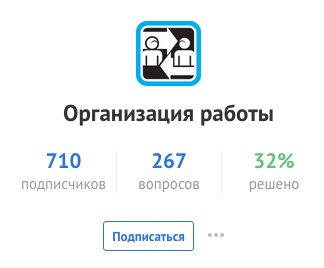
Section "Organization of work"
Interest Ask:
- "You have a project. Should the main work be easy? ”
So, you are burning with an idea, work on your project in your free time. For simplicity, we assume that the project and the work are in the field of IT. Such questions have been raised more than once that it is difficult to be in time, after work there is little strength to do something else, especially when there is a family / children - they also need attention, etc. Now we are talking about something else.
Option 1: the main work is simple, you program yourself quietly in a narrowly limited framework, rivet molds, reports, etc. Often such tasks are found in the field of ERP / CRM systems, and other business automation. To break the head over algorithms, to solve innovative problems - here it is a rarity.
Bottom line: you come home not tired, and you send strength to the project.
2: — , — , , - . , «» , .
: , . .
, , : №1 . , , , .
? ( , ), ?
ps , «» . , .
. . , . , . , . But it is not.
6 , , . 3 . . , .
, — . , , 4, . , : , , , , ,
The main work should be on tasks, not routine / routine such as testing or technical support. When there are tasks, you can plan, and the flow is sucked in, all days become the same and complete demotivation takes place.
This means that the main work can be simple, but not simpler than a certain level, - it is direct according to Einstein.
Ask and learn on the Toaster !
Source: https://habr.com/ru/post/296084/
All Articles